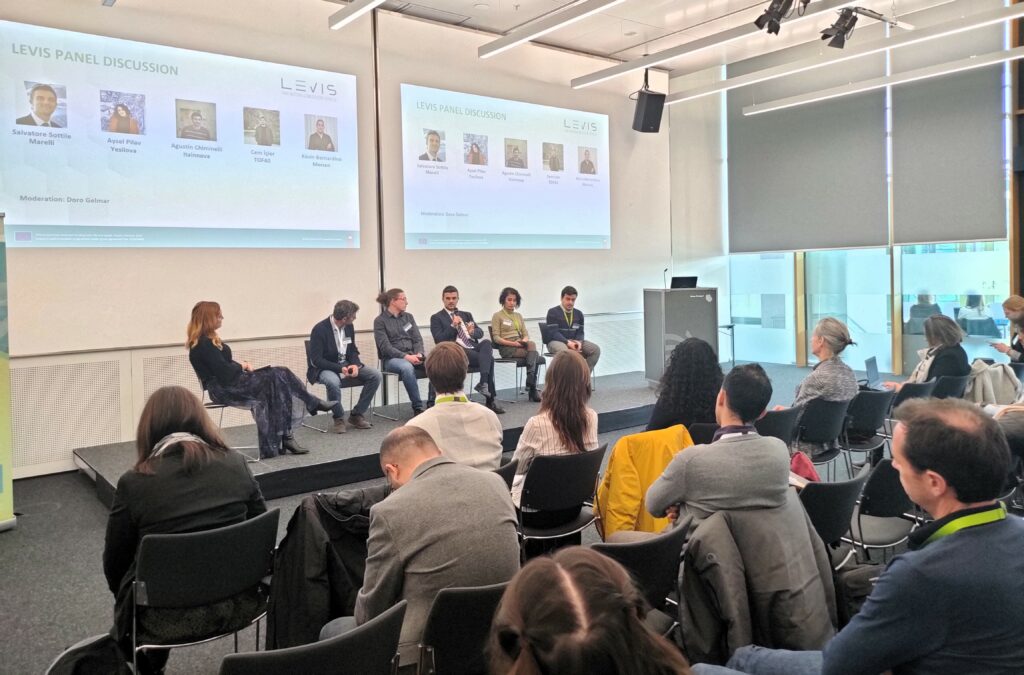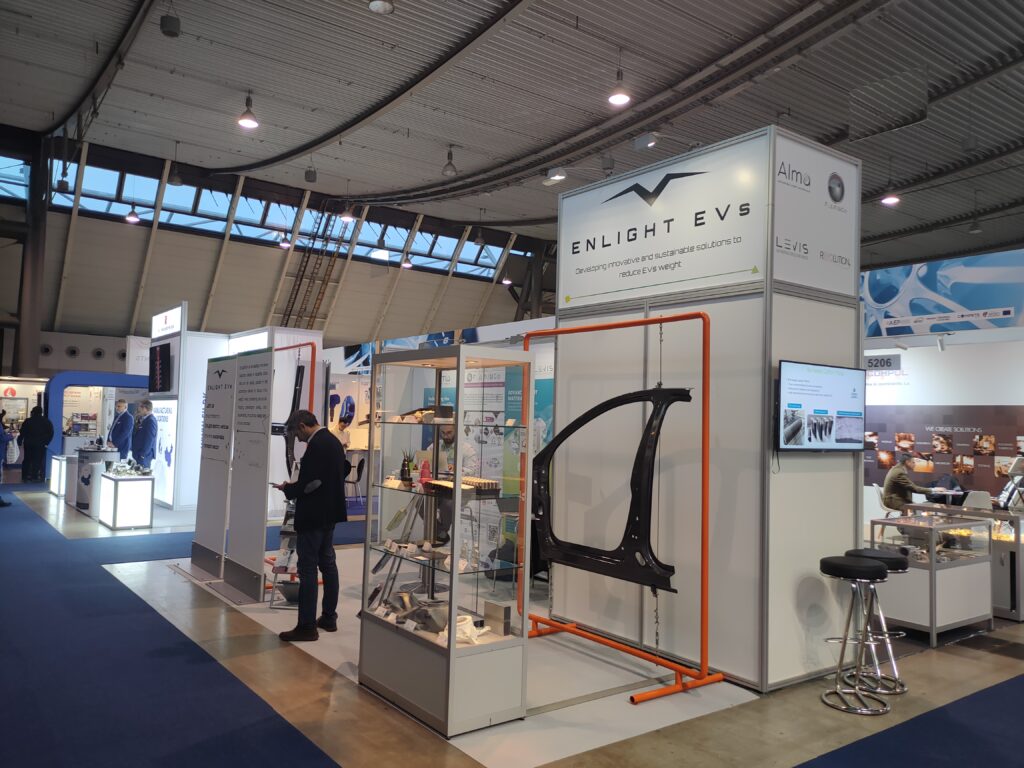On December 5, 2023, the LEVIS Event “From Concept to Reality: LEVIS’ Circular Lightweight EV Component Innovations” successfully took place at the Stuttgart Fair, held in conjunction with the Global Automotive Components and Suppliers Expo (GACS) 2023. This milestone event was an integral part of the EnLightEVs summit, themed “Leading the Way in Innovative Lightweight EV Components.” The summit, jointly organized by European-funded EnLightEVs Cluster projects LEVIS, ALMA, FLAMINGo, and REVOLUTION, sought to explore groundbreaking solutions for sustainable EV component innovations. In addition to the event, LEVIS also had the opportunity to showcase its lightweight components at its GACS booth, spanning from December 5 to December 7.
LEVIS’ Commitment to Sustainable EV Solutions
LEVIS is at the forefront of developing lightweight structural components for electric vehicles (EVs), with a strong emphasis on eco-design and circular approaches. The project leverages multi-material solutions based on thermoplastic-based carbon-fibre-reinforced polymers (CFRPs) and metals, employing cost-effective, scalable manufacturing and joining technologies. Notably, LEVIS integrates Structural Health Monitoring (SHM) systems and efficient dismantling and recycling solutions to enhance sustainability and structural integrity.
EnLightEVs Cluster: Advancing Sustainable Automotive Innovations
LEVIS is a pivotal part of EnLightEVs, a cluster of EU-funded projects dedicated to rapidly reducing EV weight in the automotive market. The cluster catalyzes knowledge exchange between industry and academia, promoting sustainable automotive innovations and the use of lightweight, environmentally friendly materials in vehicle structures. The EnLightEVs summit was expertly guided by Salima Abu Jeriban, Project Adviser for Clean Road Transport at the European Climate, Infrastructure, and Environment Executive Agency.
LEVIS’ Showcase of Expertise and Innovation
During the LEVIS session at the EnLightEVs cluster event, the project’s representatives unveiled their work, highlighting eco-design and circular approaches in the creation of lightweight EV components. Agustín Chiminelli, Technical LEVIS Project Coordinator from ITAINNOVA, opened the session by providing valuable insights into the project’s objectives, expected outcomes, impacts, and the technological foundation driving its innovations.
Salvatore Sottile from Marelli and Cristian Builes Cárdenas from AIMEN captured the audience’s attention with their presentation on “Sustainable composites and advanced processes for the development of a novel Suspension Arm.” Their exploration delved into the use of CFRP and the advantages of Thermoplastic Resin Transfer Moulding (TP-RTM) in achieving weight reduction in EVs.
Aysel Pilav from Yeşilova, alongside Clara Valero from ITAINNOVA, shared insights during their presentation titled “Lightening EV battery boxes through advanced and sustainable multi-material solutions.” They unveiled groundbreaking technologies and materials that contribute to the development of lightweight and sustainable battery boxes for electric vehicles. This presentation highlighted the use of thermoplastic recyclable carbon-fibre-reinforced polymers (TP-CFRP), bio-carbon fibres (bio-CF), recycled carbon fibres, and aluminium.
Kévin Bernardino from Mersen and Blanca Lekube from Leartiker presented “Innovation & modularity for battery cell housing, interconnection, and monitoring.” Their focus was on the development of a busbar, encompassing module housing and sensors, and included insights from a comprehensive life cycle analysis that examined climate change, human toxicity, and fine particulate matter formation.
The session concluded with Cem İçier from Tofaş and Blanca Lekube from Leartiker discussing “Eco-design of steering column carrier group using innovative and sustainable materials and processes.” They presented sustainable materials as alternatives to steel, highlighting advancements in laser texturing, overmoulding processes, and virtual and physical validation tests.
Following these presentations, a LEVIS panel discussion provided an opportunity for an in-depth exploration of the topics with active audience engagement.
Inspiring Collaboration for a Greener Future
The LEVIS and the EnLightEVs event not only facilitated substantial exchange among partner projects within the EnLightEV cluster but also underscored the importance of collaboration and shared learning in the EV sector.
Agustín Chiminelli, Technical Coordinator of LEVIS, commented on the event’s significance:
“The LEVIS event was not only a showcase of our technologies and our progress in the projects but also valuable insights about how to implement eco/circular by design approaches in the automotive sector were presented. The dedication and expertise showcased during this gathering reaffirm the commitment of the EnLightEVs Cluster projects and their partners to a greener and more sustainable future in the electric vehicle industry.”
Aysel Pilav from Yeşilova, co-presenter of “Lightening EV battery boxes through advanced and sustainable multi-material solutions” added:
“It was truly rewarding to witness the strong enthusiasm and shared commitment to sustainable innovation during the event. The insightful presentations, engaging discussions, and collaborative spirit among projects within the EnLightEV cluster have set the stage for even greater strides in lightweight and eco-friendly EV components.”
In addition to the Cluster Event, the EnLightEVs projects collectively hosted a booth at GACS that attracted numerous visitors eager to learn more about the groundbreaking EV lightweighting technologies developed by LEVIS and fellow EnLightEVs projects. LEVIS featured components developed for a lightweight suspension control arm, battery box, battery cell housing, and cross-car beam. This enthusiastic interest demonstrates the growing demand for sustainable solutions in the automotive sector and the pivotal role projects like LEVIS play in shaping the future.


